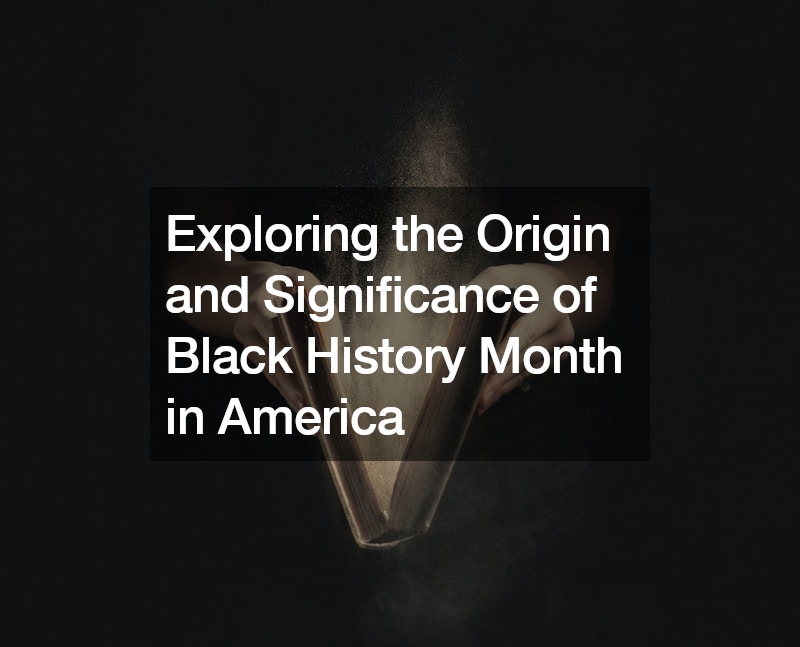
Every February, the United States observes Black History Month, a time to commemorate the stories, achievements, and milestones of African Americans. From classrooms to media outlets, the focus shifts towards celebrating the rich tapestry woven by Black contributions throughout American history. But how did this dedicated month come to be, and why is February significant?
The story of Black History Month begins with Carter G. Woodson, a pioneering scholar widely regarded as the father of African American studies. Inspired by the national celebration of the Emancipation Proclamation’s 50th anniversary, Woodson, along with others, co-founded the Association for the Study of Negro Life and History (ASNLH) in the early 20th century.
The ASNLH aimed to address the glaring omission of Black history in American academia. Their efforts to bring this crucial subject to the forefront gained momentum, culminating in the launch of “Negro History Week” in 1926.
The chosen week in February held a symbolic significance. It encompassed the birthdays of two influential figures in the fight against slavery: Abraham Lincoln, the former president, and Frederick Douglass, the renowned abolitionist. Their birthdays, on February 12th and 14th, respectively, served as a fitting reminder of the ongoing struggle for Black freedom.
Negro History Week proved to be a catalyst for change. It fostered a sense of community and cultural pride among African Americans, while also piquing the interest of the broader public. Throughout the years, the celebration gained traction, particularly during the Civil Rights Movement of the 1960s. This era saw a growing consciousness of Black identity and a shared heritage, further amplifying the importance of recognizing Black history.
By 1976, the ASNLH, by then renamed the Association for the Study of African American Life and History (ASALH), lobbied for official recognition of Black History Month. Their efforts paid off when President Gerald Ford declared February a dedicated month for celebrating Black history. President Ford’s statement urged the public to actively participate in the commemoration, highlighting the “too-often-neglected accomplishments of Black Americans in every area of endeavor throughout our history.” This sentiment has been echoed by subsequent presidents, including President Joe Biden, who emphasizes the importance of reflection alongside celebration. Black history month speakers throughout the nation use this time to not only honor past achievements but also to spark conversations about ongoing struggles and the path towards a more equitable future.
Beyond February: A Year-Round Exploration
The significance of Black History Month extends far beyond a single month. It serves as a springboard for year-round exploration and appreciation of Black history’s richness and complexity. Educational institutions dedicate curriculum time to delve deeper into the contributions of Black mathematicians, engineers, and medical professionals, whose achievements have often been overlooked or downplayed. Museums and historical societies host exhibits that not only shed light on the stories of enslaved people and the Underground Railroad, but also explore the vibrant history of Black music, literature, and visual arts. Community organizations arrange events that celebrate Black cuisine, fashion, and social movements.
Elevating Black Voices in the Present
Black History Month also serves as a platform for amplifying contemporary Black voices. Black history month speakers, including scholars, artists, and activists, use this time to engage audiences in critical discussions about the ongoing fight for racial justice. These discussions delve into topics such as police brutality, mass incarceration, and voter suppression, raising awareness about the systemic inequalities that continue to plague American society. Furthermore, Black entrepreneurs, educators, athletes, and professionals across various fields are invited to share their experiences and perspectives. These contemporary voices demonstrate the ongoing impact of Black excellence and inspire future generations.
Black History Month and the Media
The media landscape also plays a crucial role in amplifying Black voices and stories during Black History Month and beyond. Documentaries, films, and television shows that explore Black history and culture are highlighted. News outlets dedicate special coverage to issues facing the Black community and feature interviews with Black thought leaders. Social media platforms become spaces for celebrating Black excellence, with hashtags like #BlackHistoryMonth and #BlackLivesMatter trending throughout February.
A Call to Action
However, celebrating Black history isn’t simply about historical figures and past events. It’s about acknowledging the ongoing journey towards equality and recognizing the contributions of Black Americans in the present day. By celebrating these contemporary figures alongside historical heroes, Black History Month provides a holistic perspective on the enduring impact of Black excellence.
In conclusion, Black History Month is more than just a designated period on the calendar. It’s a call to action, a reminder of the ongoing need for education, reflection, and celebration. By delving into the rich tapestry of Black history, we gain a deeper understanding of the American story and its complexities. Black History Month speakers throughout the nation remind us that this exploration is not confined to a single month; it’s a continuous process that fosters a more inclusive and equitable future for all.
.







